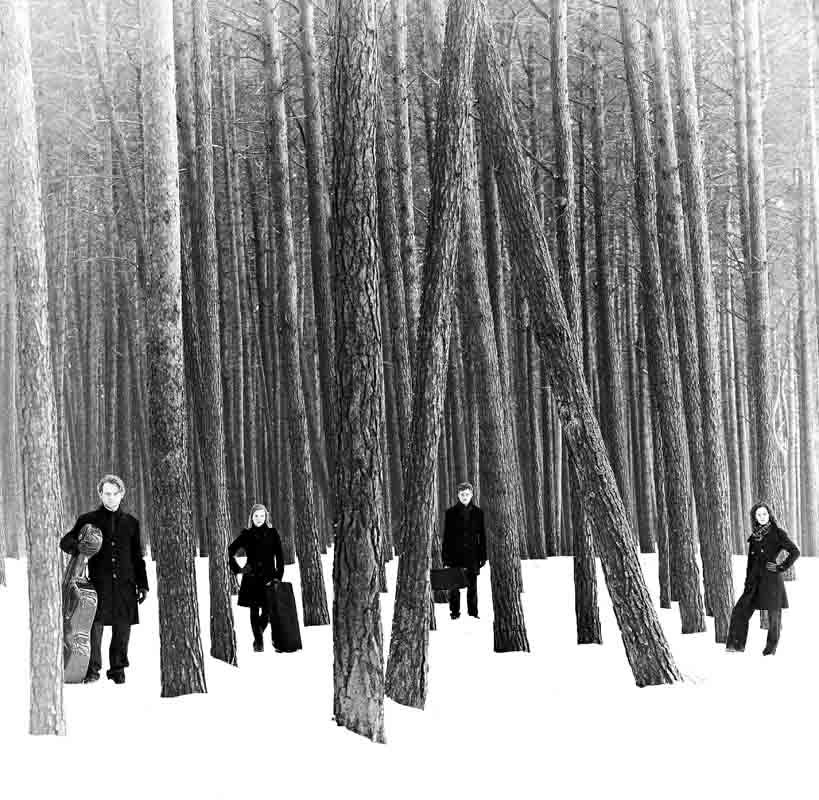Notoriously self-critical 19th century German Romantic Johannes Brahms composed his Piano Quartet in G minor, Op. 25, during a particularly rocky time in his life. Not only had he relinquished posts in Detmold as a court piano teacher and choir conductor in favour of moving to Hamburg to conduct a women’s choir, he had also – despite being briefly engaged to Agathe von Siebold – fallen in love with his mentor’s wife and muse, noted pianist Clara Schumann (five months after Brahms blazed into their life, Robert Schumann tried to drown himself in the Rhine; he died two years later in an asylum). Being turned down for the position of Hamburg’s Philharmonic concert conductor at the same time did very little to improve his mood.
Brahms’ conflicting emotions found a fittingly cathartic outlet in his four-movement quartet, which despite taking him six years to finish moves swiftly from the spirited to the explosive. The Intermezzo during the second movement was written, so Brahms told Clara, while he was thinking ‘only of her’. The former child prodigy replied: “It lulled me into such gentle dreams, as if my soul was floating on the notes.” The finale, ‘alla Zingarese’, is of such extraordinary force that it prompted Hungarian violinist Joseph Joachim to declare that Brahms, a close personal friend, had dealt him “a resounding defeat” (another celebrated violinist, Josef Hellmesberger, said of Op. 25: “This is Beethoven’s legacy”).
No less revolutionary for its time was Wolfgang Amadeus Mozart’s Piano Quartet in G minor, KV 478, which, a century earlier, had paved the way for a new musical genre. For the first time in music history, the cello was given a voice of its own, independent from the bass line of the piano. Chamber music would never be the same again: now, the strings of the violin, viola and cello could be brought together in a united front complementing the piano. Alternatively, they could be separated, and each given equal prominence.
Today, both pieces are among the world’s most beloved classics – even though the enduring appeal of Mozart’s quartet wasn’t immediately obvious (his Viennese publisher FA Hoffmeister had commissioned three quartets, but after disappointing sales he offered to let the composer keep his advance in exchange for tearing up the contract). Fitting, then, that they will feature in a performance by Germany’s Notos Quartett at Meta House this month, alongside the lesser known but no less impressive Piano Quartet in A minor, Op. 67, by Spanish composer Joacquín Turina.
Together since 2007, the Frankfurt-based Notos Quartett is named after the god of the south wind – sometimes a gentle breeze, sometimes the bringer of storms – in ancient Greek mythology. Winners of the 2011 Parkhouse Award in London, and First Prize at the Charles-Hennen-Concours in Holland just a few days later, theirs promises to be a suitably tempestuous performance – the sort the country is apparently developing quite the appetite for.
“In the 1960s, former King Norodom Sihanouk – a gifted musician himself – sent Cambodians to study Western Classical music in East Germany,” says Nico Mesterhaum, of Meta House, where the concert will be held. “His son Norodom Sihamoni, nowadays the King of Cambodia, enrolled at the Academy of Music Arts in Prague, Czechoslovakia to study classical dance and music. Then the civil war started. Arts and culture were destroyed by the Khmer Rouge regime.
“Nowadays, Western classical music is again new to Cambodia and Cambodians. Only a few Cambodian musicians have studied it, such as Loch Bonsamnang, Chan Vitharo, So Soronos and Him Savy, as well as established Cambodian composers Ung Chinnary and Him Sophy.
“Today there are no orchestras in Cambodia, unlike in Thailand and Vietnam. Most Cambodians only know this kind of music from TV or they have heard CD recordings, but to experience a master performance of Western classical music is a different thing. Nowadays, more and more Cambodians are joining such concerts, fascinated by the skills of the musicians and the depth of the music.”
WHO: Notos Quartett
WHAT: Piano quartets by Mozart, Brahms and Turina
WHERE: Meta House, #37 Sothearos Blvd
WHEN: 7pm May 17
WHY: It beats being Brahms and Liszt
